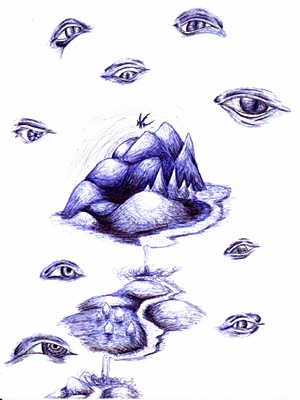All Nonfiction
- Bullying
- Books
- Academic
- Author Interviews
- Celebrity interviews
- College Articles
- College Essays
- Educator of the Year
- Heroes
- Interviews
- Memoir
- Personal Experience
- Sports
- Travel & Culture
All Opinions
- Bullying
- Current Events / Politics
- Discrimination
- Drugs / Alcohol / Smoking
- Entertainment / Celebrities
- Environment
- Love / Relationships
- Movies / Music / TV
- Pop Culture / Trends
- School / College
- Social Issues / Civics
- Spirituality / Religion
- Sports / Hobbies
All Hot Topics
- Bullying
- Community Service
- Environment
- Health
- Letters to the Editor
- Pride & Prejudice
- What Matters
- Back
Summer Guide
- Program Links
- Program Reviews
- Back
College Guide
- College Links
- College Reviews
- College Essays
- College Articles
- Back
The Living Paradox
For Koreans, the emotions and messages one’s eyes convey are crucial to human communication: they are called the ‘noon-beet’. The word is used to compliment people with gentle eyes; the word is used to chastise those with cold stares. I was a victim of the latter. Acquaintances would call me the epitome of a living paradox: “Your name is Joy but you’re more like...Scary.” My few close friends would admit to thinking that I despised them before we talked and family members would often advise me to make smiling a habit because my blank expression looked intimidating. My small, mono-eyelid eyes were deleterious to my social life.
Commonly believed to be the windows to one’s soul, eyes are the first thing people look at when approaching someone. I wish this weren’t true because this primitive instinct left me friendless and lonely for a large fraction of my life. For years, I blamed my parents for the way people saw me; had they not cursed me with such sharp blinking orbs, I would have more friends like my Bambi-eyed sister. I never pointed my finger at myself because I wasn’t the one who planted the fake anger in my eye sockets, but I soon came to realize that I had the power to kill the cold fire in my eyes. My raw noon-beet was my doing, not anyone else’s.
It was the beginning of tenth grade when I finally decided to become a new person. My goal that year was to smile and laugh more because I wanted to live up to my name. My mother had named me Joy so I would bring joy to others’ lives, but aloof, terse and usually expressionless, I am positive I didn’t follow up to my mom’s expectations. I was determined to change my noon-beet and the way people perceived me.
Smile, Joy, smile. I reminded myself as I sat in class.
She waved to you. Wave back. I forced myself midwalk.
Hurry up and wish him a nice day, I urged. People think saying that will change things.
Everyday was a struggle.
I didn’t understand how people could do all this without thinking. Did I lack a certain chromosome that carried friendliness? Was I just a natural born antisocial freak? Was my noon-beet destined to sting forever?
Even sitting here two years later, I can’t lie and say my noon-beet is the complete opposite of what it used to be. However, I know it has gotten a lot softer by the way strangers smile at me. And although I look—and am—happier, there is still an ongoing war inside me: my direct nature vs. my willingness to match my name. I don’t know if the battles will ever stop but I believe it’s better than complete silence from me and my thoughts.
Being bright isn’t my second nature—nor my third, fourth or fifth. Yet my efforts to mold myself into a joyous person have earned me the nickname ‘Happy Virus’ from my friends, church and family members. On one hand, I’m not joy; on the other, I am Joy. I am not my appearance or an internal force, but both my engraved and sketched personalities.

Similar Articles
JOIN THE DISCUSSION
This article has 0 comments.
